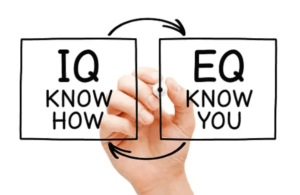Welcome Blessings!
(Tap 🔽 to see more topics!)


What are the keys to effective leadership? You’ve probably heard someone say, ‘It’s not what you know; it’s how you make people feel.’ That’s the heart of emotional intelligence and the secret sauce to genuine influence. We need more than just smarts or a title to lead from within. We need to understand ourselves, our quirks, triggers, and strengths; and tune into the emotional world of those around us.
Our emotional intelligence is the compass guiding our interactions, the bridge connecting us to others. It’s not some fancy, out-of-reach concept. It’s about how you handle tough conversations, bounce back from setbacks, and inspire the people you care about. For sure, we’ve all had moments where our emotions got the best of us, or we misread someone else’s feelings entirely. It’s human. But the good news is emotional intelligence isn’t set in stone. It’s a skill you can build, like learning a new language or practicing an instrument. And trust me, it’s worth it. When you better understand and manage emotions- your own and others, you unlock a new level of clarity, confidence, and connection.
In today’s article, I will share the 10 key strategies I learned based on experts’ insights (from different books and videos) and real-world experience that will help us develop our emotional intelligence. These aren’t just theories. They’re practical tools we can start using. At the end of the day, authentic leadership isn’t about power… it’s about impact!

What Is Emotional Intelligence?
In a nutshell, emotional intelligence (EI) is the ability to recognize, understand, and manage our emotions and the emotions of others. It’s like a compass, guiding our interactions and helping us go through the complexities of life and work. At its core, emotional intelligence isn’t some elusive skill reserved for a few people. Everyone can develop it with intention, time, and practice.
We all know that intelligence alone doesn’t guarantee success. You could be the most intelligent person in the room, but your talents might go unnoticed if you don’t connect with others or manage stress in high-pressure situations. On the other hand, emotional intelligence helps you understand the emotional dynamics around you and empowers you to act in ways that inspire, engage, and influence.
The most exciting part? Emotional intelligence can be learned and honed over time. It’s a skill, much like learning a new language or instrument. The best part about that is that everyone has the potential to grow their emotional intelligence, regardless of where they are starting from.
(Know Yourself to Lead Yourself)
Imagine you’re walking through a forest. The path is unclear, and you’re unsure where to go next. Handling the situation would be much easier if you had a map or a compass. Well, your self-awareness is like that map or compass. It’s the foundation of emotional intelligence and leadership. When you understand your strengths, weaknesses, emotions, and motivations, you’re in a much better position to handle life with clarity and confidence.
Self-awareness isn’t just about recognizing when you’re angry or stressed (though that’s certainly part of it). It’s about understanding the deeper reasons behind your reactions. Why do certain situations trigger you? What patterns do you notice in your behavior? What are your values, and how do they influence your decisions?
Take a moment to reflect. Ask yourself: What moments in my life have shaped who I am today? What makes me tick, and how do I respond to stress? By understanding your emotions and reactions, you’re setting yourself up for more tremendous success and, in turn, becoming a better leader.
(Embrace the Present Moment)
Now that we’ve discussed self-awareness let’s discuss mindfulness, which is one of the best tools for enhancing emotional intelligence. Mindfulness is being fully present and engaged in whatever you’re doing. It’s like hitting the pause button on life, allowing yourself to step back and observe your thoughts, feelings, and surroundings without judgment.
In the hustle and bustle of daily life, it’s easy to get caught up in our thoughts, distractions, and worries. But mindfulness helps you break free from the noise and become more attuned to your emotions. Whether you’re having a tough conversation, dealing with a stressful situation, or simply trying to stay calm, mindfulness can help you maintain focus and make better decisions.
A great way to practice mindfulness is through meditation or deep breathing exercises. Five minutes daily can work wonders for your emotional regulation and overall well-being. And if sitting still isn’t your thing, you can practice mindfulness by taking a mindful walk, noticing the sensations around you, and staying present in the moment.

(Seeing the World Through Someone Else’s Eyes)
Have you ever had someone listen to you without interrupting, offering advice, or trying to fix things? The sense of being honestly heard and understood is one of the most potent ways to connect with others, and that’s where empathy comes into play.
Empathy is about recognizing and understanding the emotions of others, and it’s a key component of emotional intelligence. It’s the ability to step outside your perspective and see things from another person’s point of view. By practicing empathy, you can build trust, resolve conflicts, and create deeper connections with the people around you.
Think of empathy as a bridge between two people. When you empathize with others, you can connect with them on a human level, making it easier to communicate, collaborate, and lead with influence. You can practice empathy by actively listening- without thinking about what you will say next. Ask open-ended questions, reflect on what you’ve heard, and be present with the other person’s emotions. Doing so will create a more supportive, trusting environment that fosters growth and connection.
(Managing Your Emotions in Tough Times)
We have all been there- feeling overwhelmed, frustrated, or even angry when things aren’t going the way we want. But keep in mind that emotions are natural. It’s how we handle them that makes all the difference. Emotional regulation is recognizing, understanding, and managing your emotions in a healthy, constructive way.
If emotions are like waves in the ocean, emotional regulation is the skill of learning how to ride them instead of being swept away by them. When we manage our emotions well, we’re better equipped to handle stress, avoid impulsive reactions, and respond thoughtfully.
A simple technique for practicing emotional regulation is deep breathing. When you feel overwhelmed or stressed, take a few deep breaths and focus on your breath as it moves in and out. This small act can help calm your mind, reduce stress, and reset your emotions. Over time, emotional regulation helps you remain centered, even in challenging situations, allowing you to respond with clarity and purpose.

(Building Strong Relationships Through Connection)
Emotional intelligence isn’t just about managing your emotions. It’s also about understanding how to interact with others in a way that fosters connection and trust. Strong social skills are essential for any leader, as they help you overcome complex social dynamics, communicate effectively, and collaborate with others.
Social skills include active listening, giving and receiving feedback, resolving conflicts, and motivating others. Whether working on a team project, negotiating with a client, or simply chatting with a colleague, strong social skills help build rapport and create a positive, inclusive environment.
A good way to improve your social skills is by practicing active listening. When someone is speaking, could you give them your full attention? Resist the urge to interrupt or finish their sentences. Instead, listen attentively, ask thoughtful questions, and validate their feelings. This simple act of listening can go a long way in building trust and strengthening relationships.
(Handling Change with Resilience)
One of the most essential qualities of an emotionally intelligent leader is adaptability. In today’s fast-paced world, change is constant—whether it’s a new project, a shifting market, or changes in your team. Adapting to new circumstances and maintaining a positive, flexible attitude is a key component of emotional intelligence.
Adaptability is like the ability to bend without breaking. When you embrace change with resilience, you can adjust your mindset, learn new skills, and stay focused on your goals, even when things don’t go as planned. Emotional intelligence allows you to remain calm, composed, and proactive rather than reactive when faced with uncertainty.
To improve adaptability, start by focusing on your mindset. Challenge yourself to see obstacles as opportunities for growth. Learn to stay open to new ideas and cultivate a mindset of continuous learning and improvement.

(Continuous Learning)
One of the most valuable tools for developing emotional intelligence is feedback. But feedback isn’t always easy to receive, especially if it’s critical. The key is to approach input with an open mind, seeing it as an opportunity for growth rather than a personal attack.
When you ask for feedback from others, you’re not just looking for praise; you’re seeking insights to help you improve. Embrace feedback with humility, and use it to enhance your emotional intelligence, whether in communication, conflict resolution, or emotional regulation. Remember, emotional intelligence isn’t a destination… it’s a journey. The more we practice self-awareness, mindfulness, empathy, emotional regulation, and social skills, the more we evolve as leaders.
(Fueling Your Inner Drive)
Self-motivation is the fuel that powers the engine of emotional intelligence. It drives you to keep going when things get tough and helps you stay focused on your long-term goals. Leaders with high emotional intelligence are often driven by intrinsic motivation—they’re motivated by passion, purpose, and the desire to make a positive impact.
To foster self-motivation, focus on your “why.” What motivates you to get out of bed every morning? What drives you to keep pushing forward, even when the going gets tough? When you connect with your more profound sense of purpose, you’ll find that motivation comes naturally, and you can better inspire and motivate those around you.

(The Heart of Leadership)
As a leader, your ability to build trust is paramount. Without trust, you can’t lead effectively. Emotional intelligence plays a critical role in building that trust. When you are emotionally aware, transparent, and empathetic, you create a safe space for others to be themselves and feel understood.
Trust is built on consistency, integrity, and vulnerability. When you show up authentically and communicate openly with your team, you foster a culture of trust and mutual respect. As you demonstrate your emotional intelligence through actions, you inspire others to do the same.
(Lead by Example)
Ultimately, leadership is about inspiring others to be their best selves. When you embody emotional intelligence, you become a role model for those around you. Your actions, words, and behavior set the tone for the entire team. When you lead with emotional intelligence, you inspire others to connect with their emotions, build trust, and work collaboratively toward shared goals. As you develop your emotional intelligence, remember that your leadership can positively impact not just your success but also the success of those around you. Lead by example and inspire a culture of authenticity, connection, and growth.

Leadership isn’t about having all the answers or wearing a fancy suit. It’s about how you make the people around you feel. It’s about being that person who lights up a room, not because of what you say, but because of how you listen. It’s about showing up wholeheartedly, being authentic, and helping others find their spark.
Think of emotional intelligence as your everyday superpower. It’s not some complicated thing you learn in a textbook. However, it’s about checking in with yourself, understanding where others are coming from, and choosing to respond with kindness and clarity. It’s about building those genuine connections that make work and life meaningful. There’s no finish line, no perfect leader waiting at the end. It’s about taking small, everyday steps to better understand yourself and others. Moreover, it’s about choosing empathy, overreaction, and connection over control.
Now, pick one thing from these strategies: maybe practicing mindfulness for five minutes each morning or listening to someone without interrupting, and try it out this week. See what happens. See how it feels. And if you find yourself slipping, that’s okay. We all do. Just dust yourself off and try again. Leading from within, leading with heart is a practice. And it starts with you right now. Voila! Until next time!